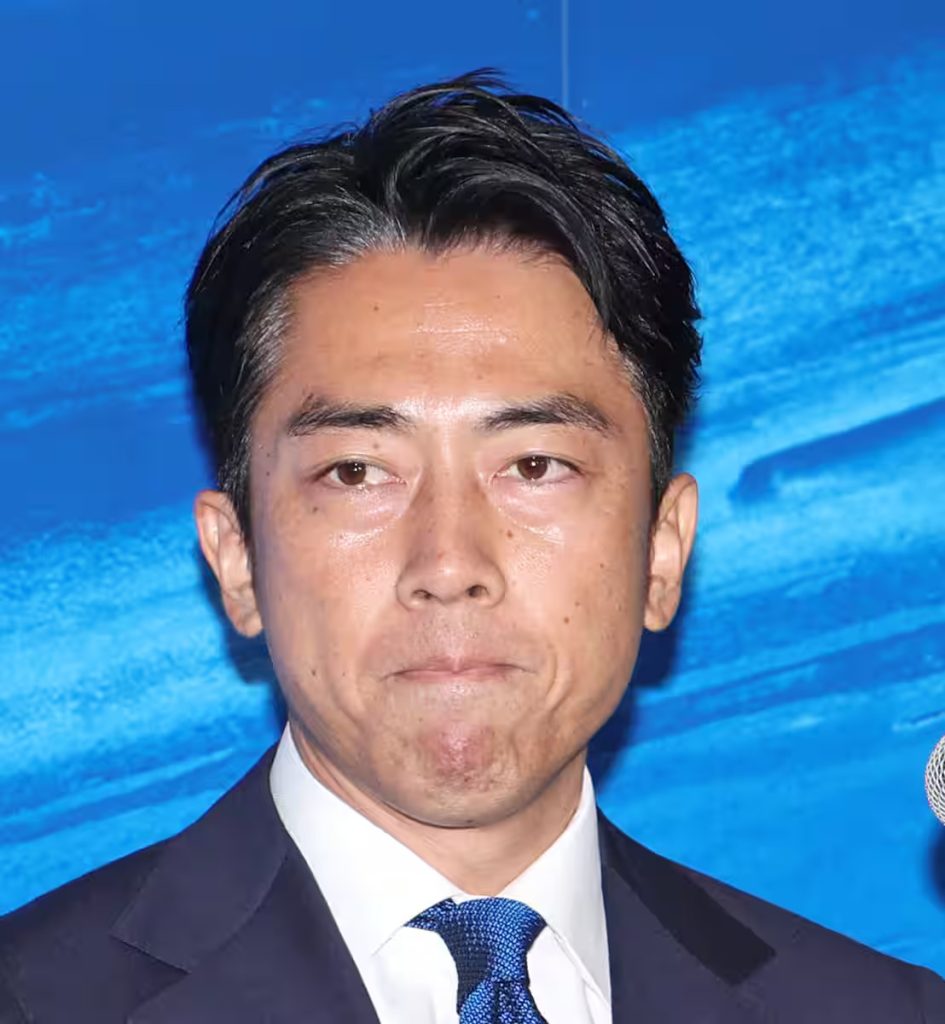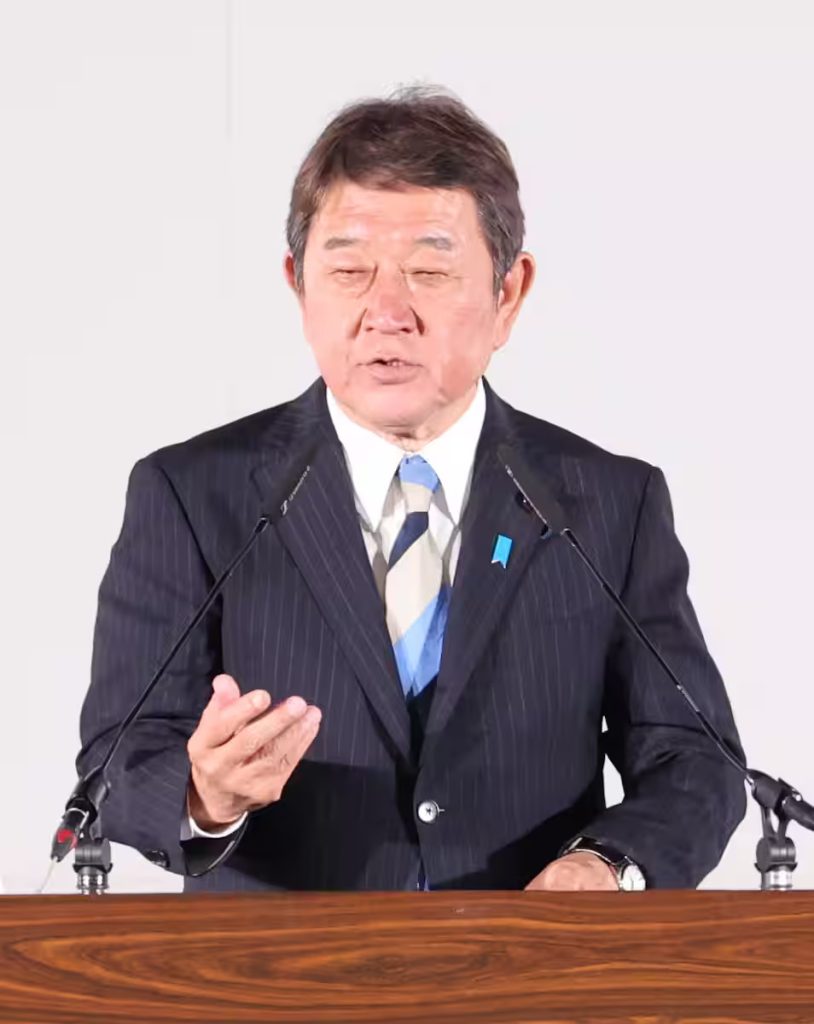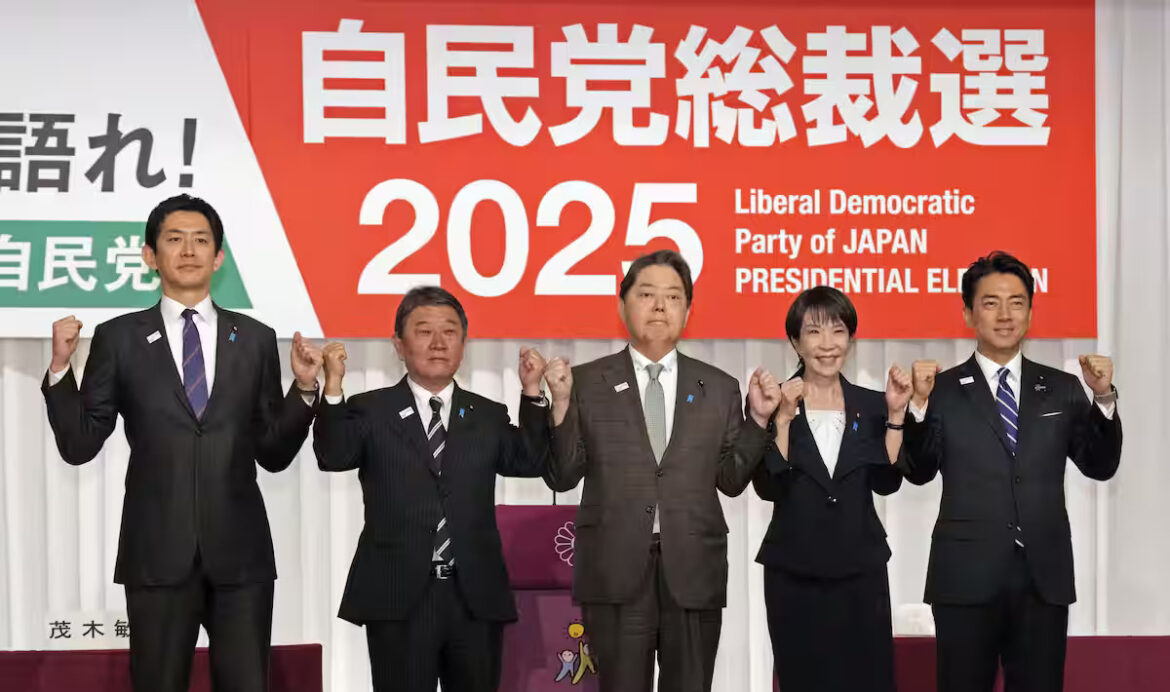The Liberal Democratic Party (LDP) will choose its next leader on October 4, setting the course not only for the ruling party but also for Japan itself. The contest comes amid rising living costs, demographic pressures, and regional security threats.
Five contenders, Sanae Takaichi, Shinjiro Koizumi, Takayuki Kobayashi, Toshimitsu Motegi, and Yoshimasa Hayashi, have stepped forward, each offering a distinct vision. Their remarks in the September 22 Nippon TV debate and the September 24 Japan National Press Club forum highlight both shared priorities and sharp contrasts.
Sanae Takaichi: Growth and Conservatism
Former economic security minister Sanae Takaichi has cast herself as the candidate who can restore both purpose and pride to the LDP. After losing in 2023, she toured the country. During this time, the stark message from the voters left a deep impression on her. In a Sankei Shimbun interview on September 25, she recalled them saying, “‘The LDP’s policies are without dreams or ambition.’ It shocked me.” That sense of urgency now underpins her campaign, she said.
At the National Press Club debate, Takaichi pointed to her strength in economic strategy, promising to pursue growth relentlessly. She pledged to scrap the gasoline surcharge, expand income tax relief, and even raise official fees such as doctors’ reimbursements to keep pace with inflation.
Her message also reflects conservative priorities. On foreign residents, she argued that coexistence requires respect for Japanese law, culture, and tradition.
She reaffirmed her push for constitutional revision, saying the LDP’s four proposed amendments are “indispensable” and that Article 9 must be revised to clearly recognize the Self-Defense Forces as an armed force. On imperial succession, she stressed that the legitimacy of the throne depends on the male line, which has been preserved for 126 generations.
Shinjiro Koizumi: Youthful Appeal, Early Missteps
Agriculture minister Shinjiro Koizumi entered the race with a cloud over his campaign. On September 26, he admitted that a supporter’s office had circulated sample comments for social media posts that praised him and disparaged rivals. “Even though I didn’t know, I feel sorry,” he told reporters. “If I were stronger, if I had been firmer, such things would not have happened.”
On stage, however, Koizumi sought to move past the controversy by projecting energy and vision. In the Nippon TV debate, he vowed, “By 2030, I want to raise average wages by ¥1 million JPY ($6,700 USD),” linking the goal to structural reform and bipartisan cooperation. On family law, his tone was more measured. He told the National Press Club that Japan must broaden life choices but emphasized that “because family and marriage are deeply rooted, we need national understanding and bipartisan agreement.”
 Shinjiro Koizumi
Shinjiro Koizumi
In foreign policy, Koizumi praised the tariff negotiations led by Prime Minister Shigeru Ishiba, saying they “deserve proper recognition.” He also committed to steadily implementing defense spending at 2% of GDP and expanding cooperation with allies.
Charismatic and media-savvy, Koizumi embodies renewal, though critics question whether his policy depth matches his popularity. Notably, he was the only one who kept returning to his notes as the debates unfolded.
 Takayuki Kobayashi: The Technocrat Challenger
Takayuki Kobayashi: The Technocrat Challenger
Former economic security minister Takayuki Kobayashi has positioned himself as the steady technocrat in the race. At the Nippon TV debate, he declared that if elected prime minister, he would “immediately instruct the creation of economic measures,” with pay hikes for essential workers among his first priorities.
Kobayashi also pressed his case for targeted tax reform, telling the National Press Club that “the ultimate countermeasure for the declining birthrate is to grow the economy and raise incomes.” He promised a proportional tax cut focused on the middle class and reforms to ease the burden of social insurance contributions.
On divisive social issues, Kobayashi favored pragmatic solutions. He argued that expanding the use of maiden names in practice offers the best way forward in the surname debate. In diplomacy, he promised to build on the legacy of Shinzo Abe, saying he would hold an early summit with Donald Trump and maximize Abe’s political inheritance.
Kobayashi lacks Koizumi’s flair or Takaichi’s factional strength. However, his detail-oriented approach may appeal to party members looking for seriousness over spectacle.
Toshimitsu Motegi: Stability and Experience
Toshimitsu Motegi has leaned heavily on his experience and reputation for steadiness. In the Nippon TV debate, he pledged to swiftly pass a supplementary budget to establish comprehensive economic measures and secure wage increases within two years.
On social issues, he struck a cautious tone. At the press club, he noted that party opinions remain divided on separate surnames. He prefers that “rather than rushing to a conclusion, it is important to continue discussions.” Also, he highlighted the generational imbalance in Japan’s social security system, warning that “for young people and child-raising households, the burden of social insurance premiums is very heavy.”
 Toshimitsu Motegi delivering a speech at IG Arena in Kita Ward, Nagoya, September 26 (©Sankei by Koji Taito).
Toshimitsu Motegi delivering a speech at IG Arena in Kita Ward, Nagoya, September 26 (©Sankei by Koji Taito).
Motegi underscored his diplomatic credentials, recalling that he “saw how Prime Minister Abe worked up close” and stressing the importance of quickly building trust with Donald Trump through an early Japan–US summit. His message of stability and unity could resonate with those inside the party who value predictability. However, will a man who once raged over not being served Evian water really connect with the Japanese public?
 Yoshimasa Hayashi: Globalist with a Social Lens
Yoshimasa Hayashi: Globalist with a Social Lens
Chief Cabinet Secretary Yoshimasa Hayashi has presented himself as a globally minded alternative with a strong interest in social policy. In the Nippon TV debate, he backed immediate economic relief for low-and middle-income households, calling for cash handouts based on the LDP’s upper house pledge of uniform payments.
At the press club, he set out a longer-term vision of creating a Japanese version of universal credit to support low-and middle-income households.
On the surname issue, Hayashi pointed to public opinion, noting that surveys show expanding the use of maiden names is the most common view, and urged more dialogue with the people. On foreign labor, he said, “workers should be accepted gradually and as needed.”
Diplomacy remains his strongest card. Hayashi promised to meet President Trump and revisit tariffs, while stressing that Japan must anchor its defense on the US alliance. Some see that as wishful thinking, given his cool reception in Washington during his time as foreign minister. US officials viewed him with suspicion, partly because of his past ties to a pro-China parliamentary group. Whether he could lead Japan’s diplomacy with the same authority as his predecessors is uncertain. Weaker factional support could also limit his leverage inside the LDP.
RELATED:
Author: Daniel Manning
Continue Reading


AloJapan.com